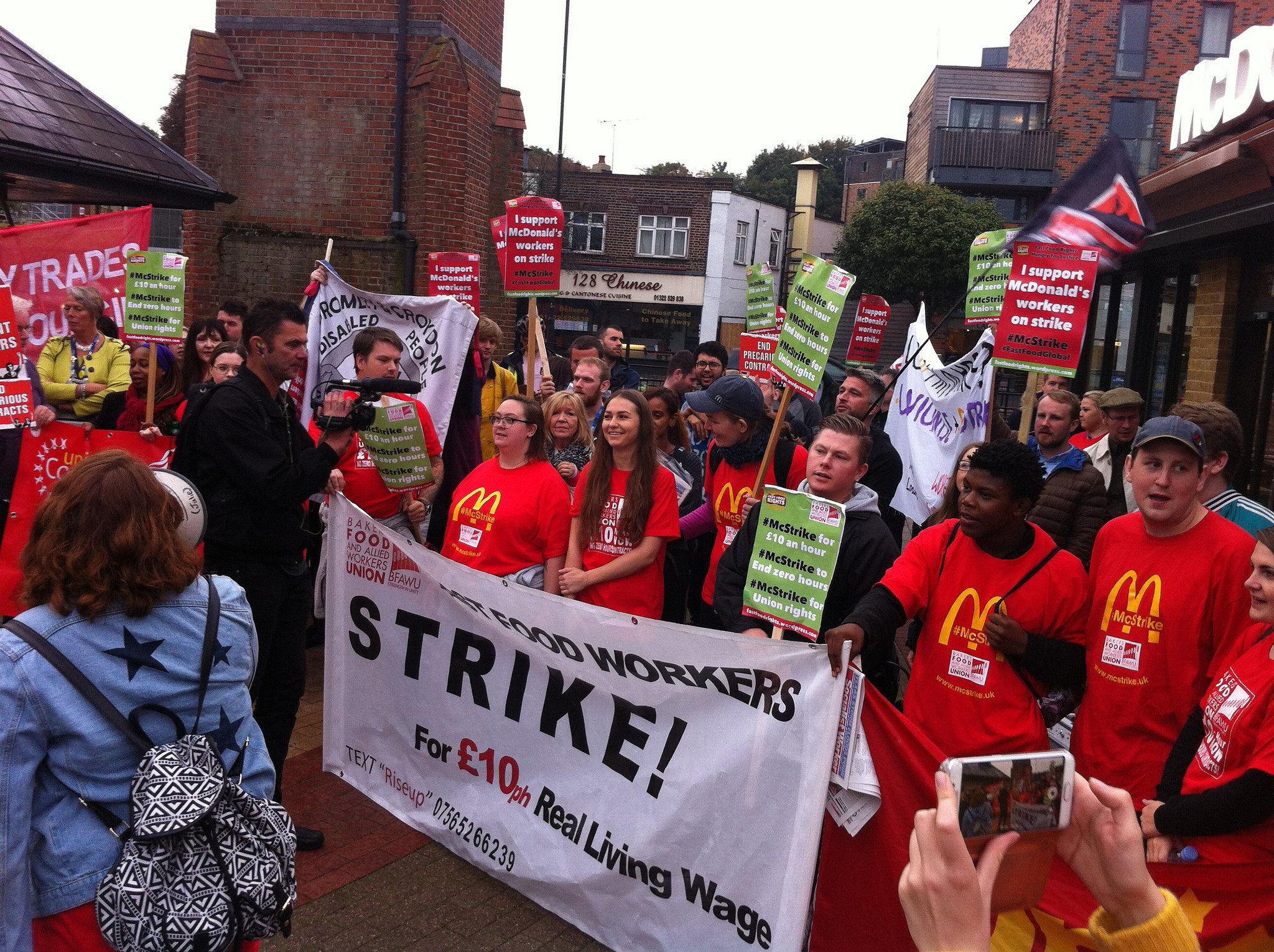People who work in McDonald’s face 10-hour shifts in difficult conditions working in the heat, suffering regular oil burns, standing for long periods of time and dealing with problem customers. Unions organising for McDonald’s workers are not recognised by the company and, add to this that they might well be on a zero-hours contract and their hourly wage is pitifully low, then you ultimately end up with conditions that lead to a national strike of McDonald’s workers.
This is why, this week here in the UK, McDonald’s workers went on strike to call for £10 an hour wages, better working conditions, the right to form a union and job security. There have also been issues of bullying and harassment at the stores that have been balloted to strike.
This is the first time McDonald’s workers have ever gone on strike in the UK.
The Baker Food and Allied Workers Union (BFAWU), a trade union in the food sector, say that this strike “forms part of a growing global movement calling for the fair and decent treatment of workers”.
Ian Hodson, National President of the BFAWU, explained, “We, at the BFAWU, fully support the historic decision by these brave McDonald’s workers to stand up and fight back against McDonald’s – a company that has let them down one too many times.
“McDonald’s has had countless opportunities to resolve grievances by offering workers a fair wage and acceptable working conditions. Instead, they have chosen to ignore their workers by tightening their purse strings – filling their CEO’s pockets, at the expense of workers here in the UK and across the world.
“This is a call for change. Our members demand to be listened too – they have a right to get their voice heard. Hopefully, senior figures at McDonald’s will be listening, because this behaviour cannot go on any longer.”
Opposition to the strike
The strike was made up of staff from only two stores, who had balloted at 96% to hold the strike. As the first McStrike in UK history, working for a company that does not recognise unionisation, it would be a nervous time for employees desperate to keep the hours they work on their zero-hours contracts without angering management into cutting down the work they can do.
Shen told Vice about the way McDonald’s management tried to undermine the efforts of the unionised workers: “We had a manager in Cambridge telling workers that if they went on strike they’d be arrested. We had Head Office literally walk up to people and say ‘are you in the union?’ It’s intimidation and it’s not fair, and we did lose a lot of confident people. But we gained a lot of people who were getting annoyed, and being like ‘how dare they do this to us?’”
However, it was not only McDonald’s management and corporate who objected to the company’s workers having their say.
Angry keyboard warriors on social media were keen to join in the discussion, contributing such pearls of wisdom as “If you want £10 an hour, get a real job!” and “Get back in the kitchen”. It goes without saying that those who are typing their vitriol against people trying to get better conditions for themselves would not last an hour in a very real fast food restaurant job, although they probably do frequent them to eat in. Given the burns that are commonplace, the objectionable attitudes from customers that they deal with, the overheated kitchens and the fact that under 21s and under 18s receive even smaller wages (in the £4 an hour region) than those who are over 21 despite doing the same work, anybody working in a fast food kitchen deserves every penny they earn, plus a generous few quid more.
Striking workers were also told they should be grateful they had jobs at all, and that they couldn’t be living in poverty because they work. However, the fact is that 60% of Britons in poverty are living in working families, as wages stagnate and prices rise. Zero hours contracts add insult to injury, ensuring that workers live on the brink of security and insecurity; keep the boss happy and get all the hours you want. Anger the boss or fail to impress one week and you may find yourself with no work for the following three weeks.
Solidarity with the strikers
To challenge those who insist that McDonald’s cannot afford to pay a living wage to its employees, one of the striking workers, Tom Holliday, told The Conversation: “McDonald’s must consider reinvesting its huge amount of net profits back into its workforce. We believe it is our right to ask for a fair treatment for the hard work we perform”.
And hard work it is, so those of us who occasionally eat at fast food joints must not be hypocritical. If we want to be treated politely and receive food that is quick and hot and tasty, we cannot complain that those dedicated staff who make that happen want some recognition in their work. They are not asking for the world – a living wage is hardly that – instead, they want to be treated in a way that recognises that it is they who keep the company afloat.
Without the people in the kitchen, on the floor, and taking orders in the drive-thru, McDonald’s – and its rivals around the world – would be nothing. To give the workers credit for that is only worthwhile if it is accompanied by wages that support people to live and conditions that support them to work safely.
Photo: War on Want/Creative Commons

